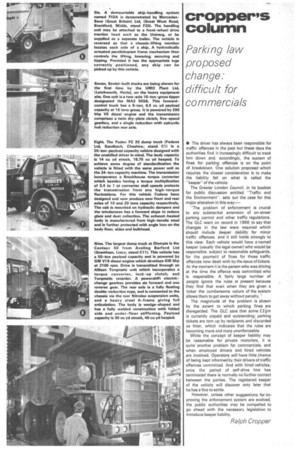cropper's column
Page 69

If you've noticed an error in this article please click here to report it so we can fix it.
Parking law proposed change..
difficult for commercials
• The driver has always been responsible for traffic offences in the past but these days the authorities find it increasingly difficult to track him down and, accordingly, the system of fines for parking offences is on the point of breakdown. One solution proposed which requires the closest consideration is to make the liability fall on what is celled the "keeper" of the vehicle.
The Greater London Council, in its booklet for public discussion entitled "Traffic and the Environment", sets out the case for this major alteration in this way:— 'The problem of enforcement is crucial to any substantial extension of on-street parking control and other traffic regulations. The GLC went on record in 1966 to say that changes in the law were required which should include keeper liability for minor traffic offences, and it still holds strongly to this view, Each vehicle would have a named keeper (usually the legal owner) who would be responsible, subject to reasonable safeguards, for the payment of fines for those traffic offences now dealt with by the issue of tickets. At the moment it is the person who was driving at the time the offence was committed who is responsible. A fairly large number of people ignore the rules at present because they find that even when they are given a ticket the cumbersome nature of the system allows them to get away without penalty."
The magnitude of the problem is shown by the extent to which parking fines are disregarded. The GLC says that some E271-m is currently unpaid and outstanding: parking tickets are torn up by recipients and discarded as litter, which indicates that the rules are becoming more and more unenforceable.
While the concept of keeper liability may be reasonable for private motorists, it is quite' another problem fOr commercials, and when employed drivers and hired vehicles are involved. Operators will have little chance of being kept informed by their drivers of traffic offences committed. And with hired vehicles, once the period of self-drive hire has terminated there is normally no further contact between the parties. The registered keeper of the vehicle will discover only later that he has a fine to settle.
However, unless other suggestions for improving the enforcement system are evolved, the public authorities may be compelled to go ahead with the necessary legislation to introduce keeper liability.
Ralph Cropper
































































































































































